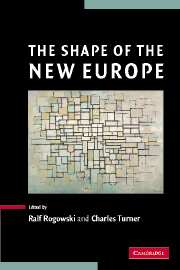Book contents
- Frontmatter
- Contents
- List of Contributors
- Acknowledgements
- 1 Europe: Law, Politics, History, Culture
- Part I Constitutionality and Political Participation
- 2 Why Europe needs a Constitution
- 3 Why Constitutionalise the European Union?
- Part II European Polity and European Civil Society
- Part III European History and European Culture
- Part IV Europe and The World
- Index
- References
2 - Why Europe needs a Constitution
Published online by Cambridge University Press: 22 September 2009
- Frontmatter
- Contents
- List of Contributors
- Acknowledgements
- 1 Europe: Law, Politics, History, Culture
- Part I Constitutionality and Political Participation
- 2 Why Europe needs a Constitution
- 3 Why Constitutionalise the European Union?
- Part II European Polity and European Civil Society
- Part III European History and European Culture
- Part IV Europe and The World
- Index
- References
Summary
There is a remarkable contrast between the expectations and demands of those who pushed for European unification immediately after the Second World War, and those who contemplate the continuation of this project today – at the very least, a striking difference in rhetoric and ostensible aim. While the first generation advocates of European integration did not hesitate to speak of the project they had in mind as a ‘United States of Europe’, evoking the example of the USA, current discussion has moved away from the model of a federal state, avoiding even the term ‘federation’. Larry Siedentop's recent book Democracy in Europe expresses a more cautious mood:
[A] great constitutional debate need not involve a prior commitment to federalism as the most desirable outcome in Europe. It may reveal that Europe is in the process of inventing a new political form, something more than a confederation but less than a federation – an association of sovereign states which pool their sovereignty only in very restricted areas to varying degrees, an association which does not seek to have the coercive power to act directly on individuals in the fashion of nation states.
Does this shift in climate reflect a sound realism, born of a learning-process of over four decades, or is it rather the sign of a mood of hesitance, if not outright defeatism?
- Type
- Chapter
- Information
- The Shape of the New Europe , pp. 25 - 45Publisher: Cambridge University PressPrint publication year: 2006
References
- 27
- Cited by



